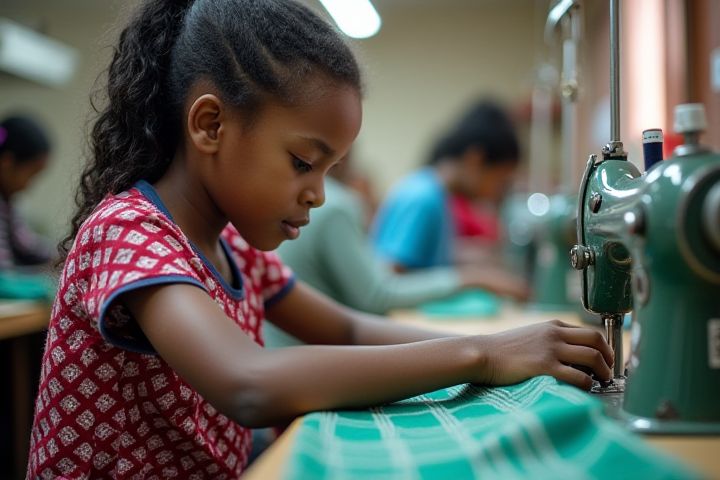
The textiles industry in Nigeria plays a crucial role in the nation's economy, contributing significantly to employment and GDP. As one of the oldest industrial sectors, it encompasses a variety of processes including weaving, dyeing, and finishing, with both traditional and modern methods coexisting. Major textile hubs such as Lagos and Kaduna have fostered skilled labor and innovation, while challenges like import dependence and inadequate infrastructure hinder growth. Investment in sustainable practices and technology can enhance productivity and quality, positioning Nigerian textiles competitively on global markets. As a consumer, supporting local brands can promote the industry's resurgence and create job opportunities for artisans and craftsmen.
Indigenous textile production
The textiles industry in Nigeria emphasizes indigenous textile production, showcasing vibrant traditions and local craftsmanship. Utilizing materials such as cotton and silk, artisans employ traditional weaving techniques to create unique fabrics that reflect cultural heritage. The sector supports local economies by providing jobs and fostering entrepreneurship among artisans and small businesses. By prioritizing sustainable practices, the Nigerian textiles industry is positioned to compete in the global market while celebrating its rich artistic history.
Cotton cultivation
The textiles industry in Nigeria heavily emphasizes cotton cultivation as its primary raw material, supporting both local farmers and the manufacturing sector. Nigeria possesses favorable climatic conditions for cotton growth, which enhances production efficiency and sustainability. The Nigerian government has implemented various initiatives aimed at boosting cotton farming, including investment in modern agricultural techniques and resources. You can witness the positive impact of revitalized cotton production on local economies, as it creates job opportunities and contributes to the overall growth of the textile market.
Import restrictions
The Nigerian textiles industry is significantly influenced by import restrictions aimed at boosting local production and reducing dependency on foreign textiles. By enforcing tariffs and quotas, the government seeks to enhance domestic manufacturing capabilities, thereby creating jobs and stimulating economic growth. This protective measure encourages investment in local textile factories, fostering innovation and improving the quality of Nigerian fabrics. As a consumer, you contribute to this shift by choosing locally made textiles, promoting sustainability and supporting local artisans.
Local fashion industry
The textiles industry in Nigeria is experiencing a resurgence, driven by the growing local fashion sector. With a rich tapestry of cultural heritage, Nigerian textile manufacturers are producing vibrant fabrics that reflect indigenous artistry and craftsmanship. This emphasis on local materials not only supports economic growth but also provides homegrown designers an opportunity to showcase their unique styles on both domestic and international platforms. By prioritizing sustainable practices and ethical production, the Nigerian textiles industry is setting a precedent for responsible fashion that resonates with socially-conscious consumers.
Government incentives
The textiles industry in Nigeria is experiencing significant growth due to various government incentives aimed at revitalizing local production. Initiatives such as tax breaks, grants, and import duty reductions encourage investment and innovation within the sector. By promoting the use of locally sourced materials, the Nigerian government aims to boost employment opportunities and enhance export potential. As a result, the industry is becoming a vital component of the nation's economic diversification strategy, ultimately strengthening Nigeria's position in the global textiles market.
Skilled labor availability
The textiles industry in Nigeria significantly benefits from the availability of skilled labor, which plays a pivotal role in enhancing production quality and efficiency. Local artisans and craftsmen possess traditional techniques that are integral to creating unique fabrics and designs, adding cultural value to the products. Furthermore, educational initiatives aimed at vocational training have improved the skill set of workers, making them adept in both modern textile manufacturing processes and artisanal practices. By investing in human capital development, the textiles sector is positioned for sustainable growth and competitiveness in both local and international markets.
Textile exports
The textiles industry in Nigeria is increasingly prioritizing textile exports as a vital component of economic growth. With rich agricultural resources for cotton production, the nation is positioned to enhance its competitive advantage in global markets. Local manufacturers are adopting modern techniques and sustainable practices to improve product quality and meet international standards. By fostering partnerships with international stakeholders, Nigeria aims to elevate its textile exports, driving job creation and contributing significantly to GDP.
Infrastructure challenges
The textiles industry in Nigeria faces significant infrastructure challenges that impede its growth and competitiveness. Limited access to reliable electricity hinders production efficiency, leading to increased operational costs for manufacturers. Poor transportation networks complicate the distribution of raw materials and finished goods, affecting supply chain reliability. You can support the need for investments in infrastructure to enhance the industry's potential and promote local manufacturing.
Sustainable practices
The textiles industry in Nigeria is increasingly embracing sustainable practices to address environmental and social challenges. Innovations in eco-friendly materials, such as organic cotton and recycled fibers, are being adopted to reduce carbon footprints and promote resource conservation. Local artisans and communities are being empowered through fair trade principles, ensuring equitable labor practices while preserving cultural heritage. By prioritizing sustainability, Nigeria's textiles sector not only enhances its global competitiveness but also contributes to a healthier ecosystem for future generations.
Regional textile hubs
The textiles industry in Nigeria is increasingly emphasizing regional textile hubs to enhance production efficiency and promote local craftsmanship. These hubs, strategically located in areas such as Kano, Lagos, and Aba, serve as centers for innovation and collaboration among manufacturers, designers, and artisans. By leveraging local resources and skills, these regions are revitalizing traditional methods while integrating modern technology to meet both domestic and international demand. Investing in these textile hubs not only boosts economic growth but also fosters job creation within the community, ensuring sustainable development for the future.
